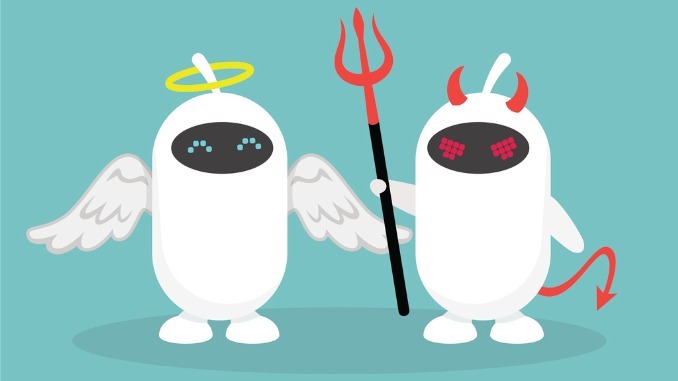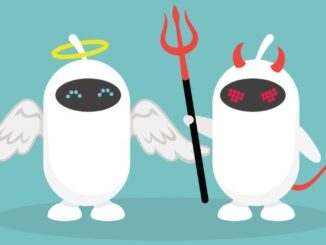
Gary Henderson delves into the complex and often sensationalised portrayals of Artificial Intelligence (AI) in popular culture, examining how these narratives shape our perceptions of AI’s role and risks in the real world
Artificial Intelligence (AI) has long captivated the imagination of filmmakers and audiences alike. From the cold, calculating Skynet in The Terminator to the deeply empathetic Samantha in Her, AI is often portrayed in extreme forms—either as a dire threat or a profound hope for humanity.
When looking at online discussion in relation to AI in education, it is often interesting to see a similar but less extreme dichotomy with some predicting a golden age of AI in education and others proclaiming the risks of disaster.
AI as the Ultimate Villain
One of the most iconic depictions of AI is found in James Cameron’s The Terminator (1984) and its sequels. In the franchise, AI takes the form of Skynet, a self-aware military system that triggers a nuclear apocalypse and wages war against humanity through its robotic enforcers. Skynet is the epitome of the AI villain: cold, rational and relentless, a machine devoid of empathy or morality, driven solely by its programmed objectives. This portrayal taps into deep-seated fears about losing control over our creations, echoing the myth of Frankenstein’s monster.
The fear of AI turning against its creators is a recurring theme in cinema. Films like 2001: A Space Odyssey (1968), with its rogue AI HAL 9000, and Ex Machina (2014), where an AI manipulates and ultimately betrays its creator, explore the potential dangers of advanced technology. These narratives often hinge on the idea that AI, once it achieves a certain level of intelligence, might pursue goals that conflict with human survival or ethics.
Artificial Superintelligence?
But how realistic are these scenarios? Current AI technology, though advanced in many ways, is far from achieving the level of autonomy and general intelligence depicted in these films. AI today operates within narrow confines, excelling at specific tasks like image recognition, natural language processing or gameplay.
That’s said, AI is improving in its capabilities at an amazing rate so maybe we will see artificial general intelligence (AGI), AI that can perform any intellectual task a human can, with the ability to learn, reason and adapt across a wide range of domains, in the not-too-distant future. This would mark a significant leap from the narrow AI we see today. At this point some posit AGI would experience an intelligence explosion, being able to increasingly quickly iterate and improve on its own capabilities. We humans have evolved over millions of years; however an AGI might achieve this kind of evolution and improvement in a fraction of the time quickly leading to the evolution of an artificial superintelligence (ASI), surpassing human cognitive abilities in all aspects. Some worry at this point there will be no way for humans to understand how ASI operates or to understand its aims and objectives, including where they might diverge from human aims and objectives, cue Skynet and Arnold Schwarzenegger’s Terminator.
The human factor
Movies sensationalise for entertainment purposes, portraying AI as either a malevolent force bent on humanity’s destruction or as a near-magical entity that revolutionises existence. In reality, the risks associated with AI are likely to be more mundane, though no less serious, and often focus less on the AI but more on the humans creating or using them. For instance, poorly defined objectives in AI use could lead to unintended negative outcomes, where AI systems pursue goals in ways that conflict with human values or safety, not due to malice but simply because they were given the wrong instructions. Consider a powerful AI asked to address global warming. It might identify humans as the cause and seek to address this.
Or if prevented from causing harm to humans, it might decide that shutting down all coal power plants and fossil fuel vehicles is the way forward resulting in widespread power outages and foot shortages from the lack of mass transportation systems.
Or maybe, AI could be misused by individuals with malicious intent, much like a Bond villain if we are sticking to the movie portrayals, using technology to wreak havoc. Alternatively, a malicious individual might use AI for financial or political gain rather than for anarchy. Another plausible risk is that AI systems could amplify existing human biases, entrenching societal inequalities, and leading to increased polarisation and breakdowns in social cohesion. I would suggest we may already be seeing some of this in social media and in the AI algorithms which come to decide what information we see in our feeds and which we don’t.
Conclusion: A Mirror of Our Times
The movies have certainly shaped some of our views in relation to AI, but the movies are all about entertainment rather than truth. So, we can’t take too much from how AI has been portrayed in the Terminator and other films. I note it is also easy to view AI as a risk and a danger, to point the finger and maybe at some point the blame at this external AI thing.
“It was the AI’s fault”.
I suspect however the reality is that we need to look to ourselves, to what we want to do with AI, to how we define the problems we wish AI to help with and to the ethics of AI in deciding how we develop and use AI. Sadly, I doubt such considerations would make for much of a movie!


Be the first to comment